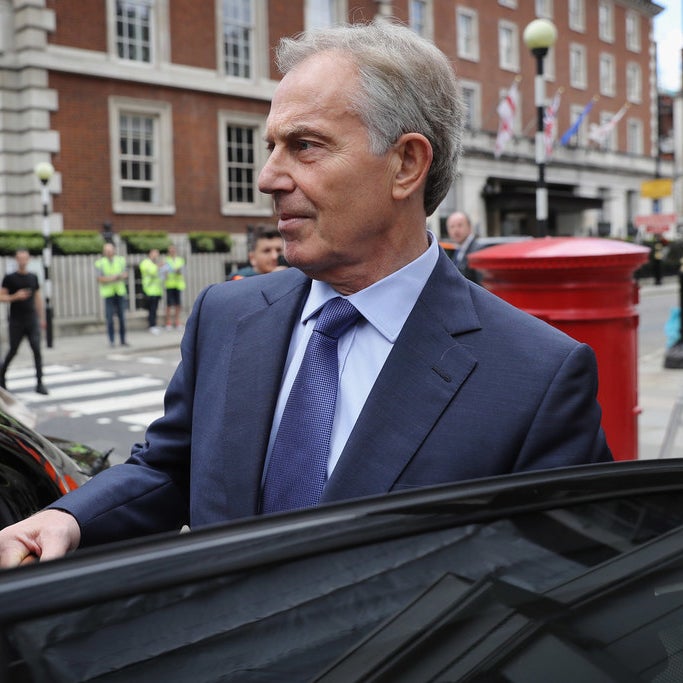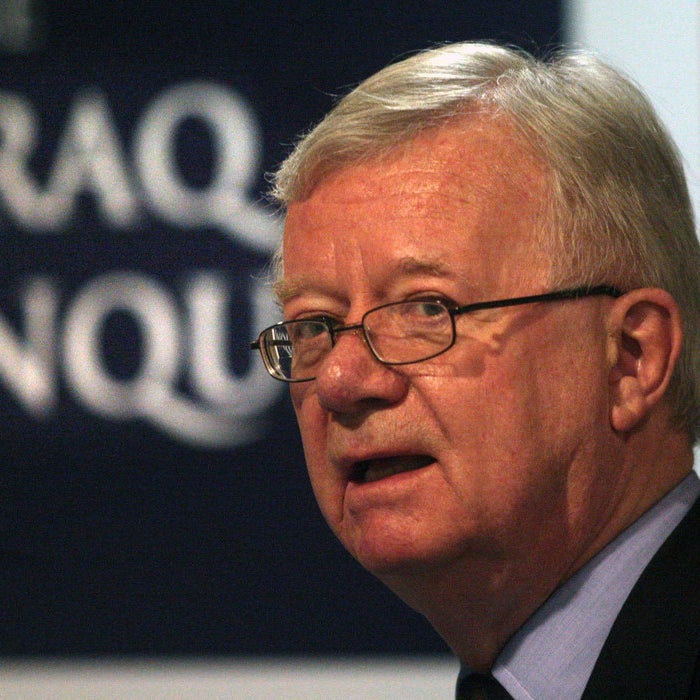

Tony Blair (left) and Sir John Chilcot (right).
After seven years, £10 million pounds, and 150 witnesses, the big day is finally almost upon us. At 11am on Wednesday, Sir John Chilcot, whose name has become a byword for delay, will publish his long-awaited findings from the official inquiry into the Iraq war. Predictions for the findings range from damp squib to the definitive proof that triggers Tony Blair's indictment on war crimes charges. So what's it all about really?
How Did It Come About?
In 2003, a US-led coalition invaded Iraq and toppled the regime of Saddam Hussein. The invasion began in March that year and Hussein was captured by December. Britain’s involvement in the war was hugely contentious, with many MPs, including from the governing Labour party, voting against military action.
In the absence of a concrete plan for the aftermath of the downfall of Hussein's regime — he had been in power since the 1970s — Iraq sank further into chaos, as sectarian violence between Sunnis and Shia engulfed the country. American and British troops, who continued to patrol the streets of major cities in the immediate aftermath, became targets of insurgent groups.

It was only in 2011 that the U.S. and Britain formally ended their military presence in Iraq, by which time hundreds of thousands of civilians, tens of thousands of insurgents, and thousands of coalition troops (including 179 British troops) had died.
Public pressure began to build for a full parliamentary inquiry. In 2009, the then-prime minister Gordon Brown announced that an independent inquiry would be launched in order to learn lessons from the Iraq war. It would be chaired by Sir John Chilcot. The Chilcot report, finally published seven years later, is the end result of that inquiry.
Who Are the Key Characters?
Tony Blair: As the British prime minister at the time, Blair persuaded parliament that the war in Iraq was necessary. Some politicians have suggested that if the report shows he mislead parliament, he could potentially be tried for war crimes – however, the International Criminal Court has said this falls outside its jurisdiction.
George Bush: The US president pushed for conflict in Iraq. Many believe that Blair had given him a cast-iron guarantee that he would support him in the years before the invasion.
Sir John Chilcot: A former civil servant, Chilcot began the inquiry in 2009. He has been criticised over the length of time the report has taken – it had been expected to take no longer than two years when it was announced, but Chilcot has said the panel underestimated the “unprecedented scope” of its inquiry.

Alastair Campbell: As the government’s press secretary, Campbell was seen as Blair’s spin doctor, who was accused of “sexing up” a crucial dossier that made the case for war.
Geoff Hoon: The former defence secretary told the inquiry that the first time he knew about the government’s claim that weapons of mass destruction (WMDs) could be deployed in 45 minutes was when he read it in the aforementioned dossier.
Richard Dearlove: The former MI6 chief at the time of the invasion has been accused by MPs of allowing Blair’s administration to put a positive gloss on the intelligence his agencies were providing.
Jack Straw: The former foreign secretary had previously told MPs that the United Nations felt there was a threat from WMDs in Iraq.
What Are the Key Issues?
The central question for many people concerns the role of Tony Blair and the aforementioned “45-minute” WMD claim made by his administration. The report is expected to look at why British intelligence sources let them down, why their claims weren’t analysed, and how they ended up being presented to the public in the form they were.
However, it’s likely there won’t be any huge revelations. A separate government review published back in 2004 has already found the intelligence used to justify the war was unreliable, and should not have been presented the way it was.

Months before the invasion, Blair told the House of Commons that a second UN resolution would not be needed to invade Iraq, but the government’s chief legal adviser has subsequently said this was not “compatible” with the legal advice he had given him.
There have also been doubts expressed by Hugh Butler, who chaired the 2004 Iraq review, as to whether Chilcot will tackle the issue of whether the war was legal or not. He told the BBC: “What [Chilcot] was asked to deal with was what happened, not only in the lead-up to the war but during the war and after the war, and what lessons can be learned from it. The legal issue wasn’t actually put to him. His review team wasn’t equipped properly to deal with that issue.”
Additionally, there are likely to be damning findings on the government’s ability to assess the threats surrounding an invasion, most notably whether Iran would remain neutral given a Sunni dictator was set to be deposed in a Shiite-majority country.
The report will also likely reveal flaws in post-invasion planning, including a failure to increase security to prevent sectarian violence, and the assumption the country’s economy could quickly recover from a conflict if its oil fields weren’t burned. The report is also expected to be critical of the British army’s response once the war turned into a messy insurgency, including how long it took to deploy new armoured vehicles. High-ranking army officials and former defence secretary Geoff Hoon might be singled out for apparent failings.
One of the key issues the report is likely to investigate is how the war led to the creation of ISIS – an argument Blair has accepted – and the subsequent effect it had on the current global affairs.
